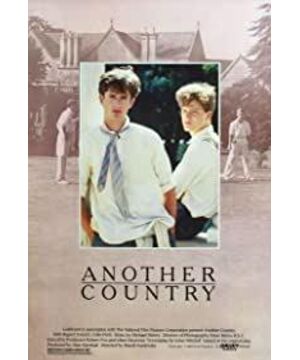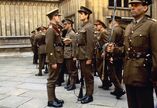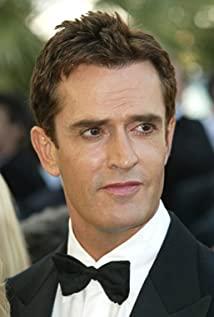Of course, it cannot be said that the British have not changed at all in the past 70 years. Comparing the Public School in the movie with today's "Independent school" in Britain, you will find many differences. The biggest change is of course the change in school management. The British public schools were founded in the Middle Ages and flourished in the Victorian period. Until the two world wars, they were basically autonomous for hundreds of years (same as Oxford and Cambridge universities). The teachers of the schools were only responsible for teaching. Discipline and punishment are the responsibility of senior students. In that era, an Eton or Winchester math or Latin teacher had basically the same status and status as a professor in Oxford and Cambridge, and basically did the same work: teaching, doing research, and writing articles. Of course, today, the power of Prefects has been greatly weakened. Teachers in these schools are no longer only responsible for teaching, but also start to take full responsibility for students' discipline and daily life. It is no longer an accomplished scholar who can become the principal of Eton, but always an experienced educator.
Another major change is the ethos in these boarding schools for boys. In the 1930s in the United Kingdom, the gender segregation between young men and women was still quite serious. They were locked up all day to live and study and rarely had the opportunity to contact men of the opposite sex. It was very easy to have same-sex love; on the one hand, homosexuality was not Accepted by the general public, on the one hand, it is very common in the dormitory. Coupled with the rebellion of young people and the yearning and admiration of ancient Greek civilization by the British since the Victorian era, this kind of open secret is recognized and accepted to a certain extent-no wonder there were scandals and discoveries in schools After the boy who tasted the forbidden fruit hanged himself, Guy would comment, "The average teacher should know the secrets in the locker room; only the teacher who has never attended a public school will open the door nosy to find out."
Today, seventy years later, there are no more secrets in the locker room. The openness of the social atmosphere and the greater freedom granted by the school have given normal channels for repressive sexual impulses to vent. In today's British boarding schools, "faggot" is almost the most dirty vulgar language. Only students will be expelled for spending the night with their girlfriends, and no one will be punished for being gay like Guy. This change in British society is actually very interesting: homosexuality was not publicly accepted 70 years ago, and it was even a criminal offence (for which Wilde went to jail), but it was a widely acquiescence behavior in private; Today, 70 years later, homosexuality is no longer publicly excluded, and homosexual groups have even been established on college campuses, but they are no longer permitted and respected in private—at least among young people.
However, the main axis of this film, and the topics to be discussed, are not just homosexuality, but the ones that British intellectuals have always liked the most for the past seventy years: class, loyalty, political compromise, and individual and social groups. Inter-relationships-how individuals find their place in a society, and how should this society tolerate those who are out of place. Each of these themes is very interesting. Taking class as an example, Chinese audiences may not understand the sensitivity of this issue in the UK, because this country still has a very clear class division: an ordinary Englishman, just from The social status and family origin of others can often be judged from the accent of speaking. This is hard to imagine in China where the social class was completely subverted by the Cultural Revolution.
Another example is loyalty. In the United Kingdom in the 1930s, loyalty to the country and the monarch was a very natural thing, and it was a necessary quality for a gentleman. Rebels like Judd were still very few. But after the end of World War II and the collapse of the British Empire, colonialism, the empire, and even the monarchy and aristocracy system have received the most widespread and widespread criticism, so that today's British people are not afraid and unwilling to express themselves as much as the Americans. Patriotic passion. The comment made by the old Guy at the beginning of the film—"Treason to what, loyalty to whom, this is what really matters."—In fact, it is also what many British people are confused about today: the empire they were loyal to is not only It has been disintegrated and proved to be evil; although the monarchs they once worshiped are still there, they have already walked off the altar and have become the talk of the gossip tabloid. Together, loyalty and patriotism seem to have become values that should be criticized.
But what interests me most are the political struggles and compromises portrayed in the second half of the film, which may be the most profound theme of the film. In order not to allow Fowler, who is the most rigid, harshest, and hated by the most people, to stay and become a year-old leader for another year, on the one hand, rebellious Judd gave up his creed of "opposing class oppression" under Guy's persuasion and agreed to serve as Prefect; On the other hand, the current grade leader retained Devenish, who had originally planned to leave, through an exchange of benefits. In this way, it was Guy who was ultimately hurt because of the exchanged benefits (becoming a member of the student elite group "Gods" ) Originally belonged to him. Guy is of course very angry and sad, because he found that the British class interest groups are very hypocritical, ruthless and repulsive of dissidents. Once he exposes his homosexuality too publicly, he will only be left out and excluded. Many other students did what he did, but it was not made public.
But on the other hand, this kind of exchange of interests, bargaining, and compromise has been the most loved and admired political manipulation method for the British for hundreds of years. We should note that the image of the senior in the entire movie is not portrayed as unbearable as Fowler, but rather mature and calm; British audiences may sympathize with Guy, but they may not blame the senior, because he is successful after all. The ground achieved the most important goal: to avoid Fowler as the prefect of the year. On the contrary, it was Judd, who was full of revolutionary and Marxist fantasy, and the old Guy, who was dressed in disorder and had a portrait of Lenin in the room, made people feel a little ridiculous and uncomfortable. This should also be the most fundamental belief that the British have not changed in the past seventy years, that is, compromise and exchange are indispensable means in social life. This is why in this environment, a life like Guy who is extremely individualistic and unwilling to cover his behavior with a disguise to satisfy social perceptions is bound to be in a highly organized and group society like the United Kingdom. It is a tragedy, because such an incompatible person must lack the support of the group, and it must be the one who was sacrificed first in society.
Link: http://jiong.wykehamist.com/blog/2008/12/blog-post_27.html
View more about Another Country reviews











